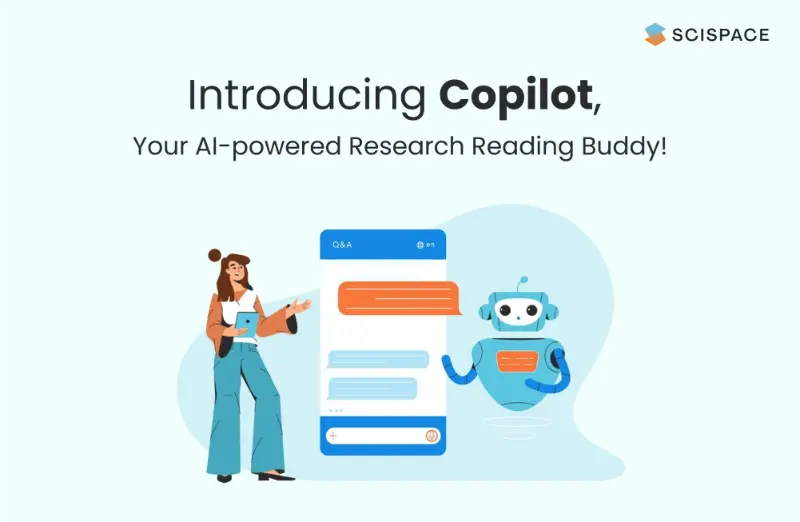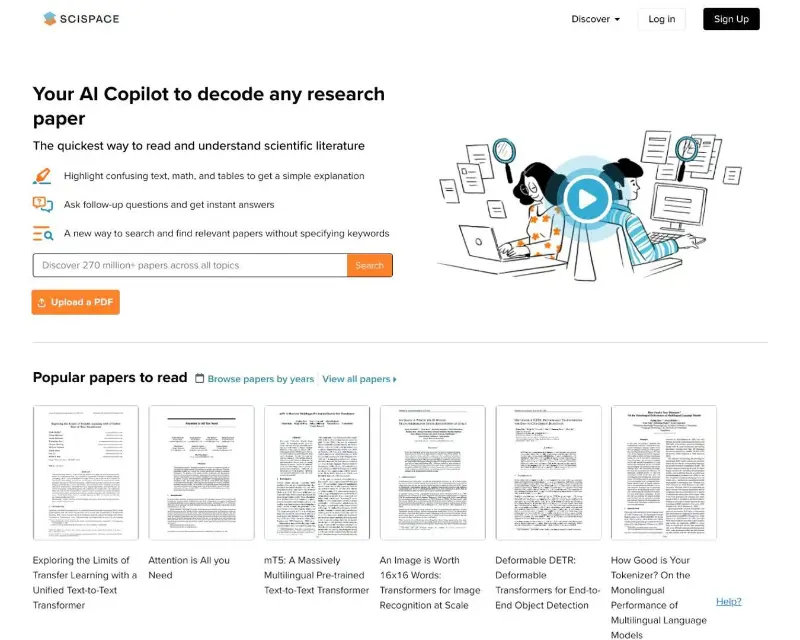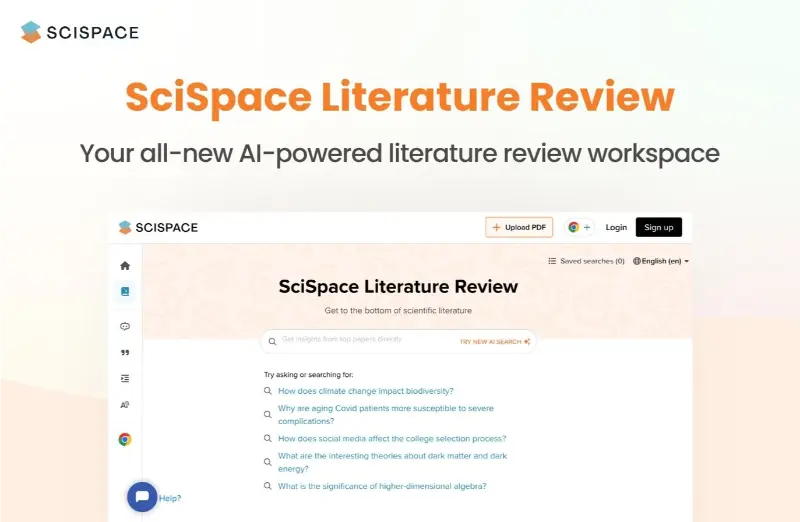In a world increasingly reliant on technology for efficiency, the academic and scientific community is experiencing a radical transformation. Artificial Intelligence (AI) has not only automated mundane processes but also elevated the way researchers approach data, analysis, writing, and publication. Among the most comprehensive AI tools for scholarly work is SciSpace —a multifunctional platform that integrates various capabilities to support researchers, students, and academic writers from start to finish.
This review offers an in-depth exploration of SciSpace’s features, especially its nine key tools, with an emphasis on how each one contributes to academic workflows. Whether you are conducting a literature review, preparing a manuscript, or verifying your citations, SciSpace provides intelligent solutions at every stage.
Table of Contents
Overview of SciSpace

SciSpace, formerly known as Typeset, is a comprehensive platform that leverages AI to assist users in various stages of academic research. From literature reviews to manuscript preparation, SciSpace offers a suite of tools aimed at enhancing productivity and ensuring the quality of scholarly work. The platform’s intuitive interface and robust features make it a valuable asset for researchers across disciplines.
Key Features of SciSpace

Literature Review
SciSpace provides a robust, AI-enhanced Literature Review tool designed to revolutionize how users search for academic papers. Instead of skimming through databases and piecing together summaries manually, this tool enables researchers to:
- Input specific queries and receive comprehensive overviews of relevant studies
- Generate concise summaries, key findings, and research gaps automatically
- View visual mappings of research clusters and trends
- Compare methodologies, sample sizes, and conclusions across papers
- Save and organize selected works in thematic folders for future access
This function is crucial for early-stage research when scholars must establish a theoretical foundation or understand the current landscape of a field quickly and accurately.
Find Topics
Finding research-worthy topics is one of the most challenging parts of beginning a new academic endeavor. SciSpace addresses this with its Find Topics tool that sifts through over 285 million research papers to:
- Identify emerging trends and underexplored research niches
- Suggest topic clusters based on citation velocity, field popularity, and novelty
- Offer real-time filtering by publication date, domain, or author influence
- Recommend angles and questions that can be expanded into full research proposals
This is particularly useful for graduate students or early-career researchers looking to define a unique and impactful research direction.
Extract Data
Instead of reading hundreds of pages, SciSpace’s Extract Data function enables users to extract and synthesize key data points from multiple PDFs. With this feature, users can:
- Automatically gather summaries, conclusions, and experimental findings from uploaded documents
- Compare results across several papers side-by-side
- Extract tables, graphs, or statistical values, and convert them into structured formats (CSV/Excel)
- Identify commonalities and discrepancies in datasets and study designs
This tool accelerates meta-analysis, systematic reviews, and any research that requires cross-paper data validation.
Paraphraser
The Paraphraser tool is built to assist users in refining their academic writing by enhancing clarity, reducing redundancy, and ensuring originality. More than a basic synonym replacer, this AI-powered utility can:
- Rephrase sentences according to different tones: academic, formal, creative, and conversational
- Improve sentence structure, fluidity, and transition logic
- Automatically remove passive voice or fix ambiguous phrasing
- Provide options for multiple rewordings for the same input text
- Help non-native English speakers elevate their writing to publication-level quality
This tool is ideal for researchers writing theses, journal articles, or conference abstracts who want to avoid plagiarism while maintaining their intended message.
Citation Generator
Proper referencing is essential in academic writing, and SciSpace simplifies it with its Citation Generator. With support for 2,300+ citation styles, this tool allows users to:
- Automatically format references in APA, MLA, Chicago, Harvard, Vancouver, IEEE, and more
- Generate citations from DOIs, URLs, article titles, or uploaded PDFs
- Insert inline citations and bibliography lists into documents effortlessly
- Export citations into BibTeX, EndNote, and Zotero-compatible files
- Detect incorrect or outdated citations and suggest accurate replacements
It’s an indispensable resource during manuscript preparation, peer review, or academic presentations.
AI Detector
As AI-generated content becomes more prevalent, academic integrity must be safeguarded. The AI Detector evaluates whether a piece of text was likely authored by a human or an AI system by:
- Scanning writing patterns, sentence predictability, and complexity
- Offering probability scores and visual indicators of potential AI-generated segments
- Highlighting sentences or phrases that appear to be machine-written
- Suggesting ways to humanize detected AI-generated content
- Assisting educators, peer reviewers, and journal editors in validating submissions
This tool is timely and relevant for a world navigating the blurred lines of human-AI authorship.
Research PDF to Video
With the Research PDF to Video feature, SciSpace transforms traditional static research papers into interactive and visually compelling videos. This tool empowers authors to:
- Convert complex scientific material into short explainer videos using AI narration and animations
- Enhance knowledge dissemination by appealing to visual and auditory learners
- Improve engagement on platforms like YouTube, Twitter, and academic seminars
- Customize visuals, transitions, and voice styles
- Make their research accessible to a broader audience, including non-specialists
This innovative tool bridges the gap between academia and digital media by offering dynamic alternatives to classic research dissemination.
Ask PDF / AI Copilot
Closely related to the “Chat with PDF” function, the AI Copilot acts as an intelligent assistant within any PDF. It allows users to:
- Ask direct questions like “What is the conclusion of this study?” or “What methods were used?”
- Receive contextual answers linked to specific sections or paragraphs
- Extract complex statistical results or formulae explanations without external research
- Get citation-ready summaries of large sections with a single query
- Bookmark insights for integration into your own work
This tool is a massive time-saver and knowledge booster, especially during dense or technical reading.
Document Summarizer (Deep Review)
SciSpace’s Deep Review mode is an advanced summarization tool designed to:
- Provide granular breakdowns of long research articles
- Highlight objective, methodology, results, and conclusion individually
- Create structured outlines suitable for literature matrices
- Compare summarized content from multiple papers at once
- Tag content based on relevance, recency, or uniqueness
This feature ensures that researchers don’t miss subtle yet critical distinctions across studies and can make informed comparisons quickly.
Benefits for Researchers

- Time Efficiency: By automating literature reviews and providing writing assistance, SciSpace allows researchers to allocate more time to data analysis and hypothesis testing.
- Enhanced Understanding: The interactive PDF feature aids in comprehending complex studies, making it particularly beneficial for early-career researchers or those venturing into new fields.
- Improved Writing Quality: The AI writing assistant ensures that manuscripts are well-structured and adhere to academic standards, increasing the likelihood of publication.
- Academic Integrity: With built-in plagiarism and AI content detectors, SciSpace helps maintain the originality and credibility of research outputs.
Conclusion
SciSpace has emerged as a holistic research assistant that embodies the ideal integration of artificial intelligence and academic rigor. With its suite of nine essential tools—each meticulously crafted to address a specific need in the scholarly journey—SciSpace supports users in idea generation, reading, writing, editing, citing, verifying, and publishing.
From simplifying the literature review process and finding impactful topics to rephrasing content, detecting AI authorship, and even converting PDFs into engaging videos, SciSpace goes beyond being a tool—it’s a full-fledged research ecosystem.
Its intuitive interface, expansive feature set, and AI responsiveness make it suitable not only for senior researchers and PhD candidates but also for undergraduate students and professional academic authors. As academia continues to evolve, tools like SciSpace will become indispensable in both accelerating research and enhancing its quality.

